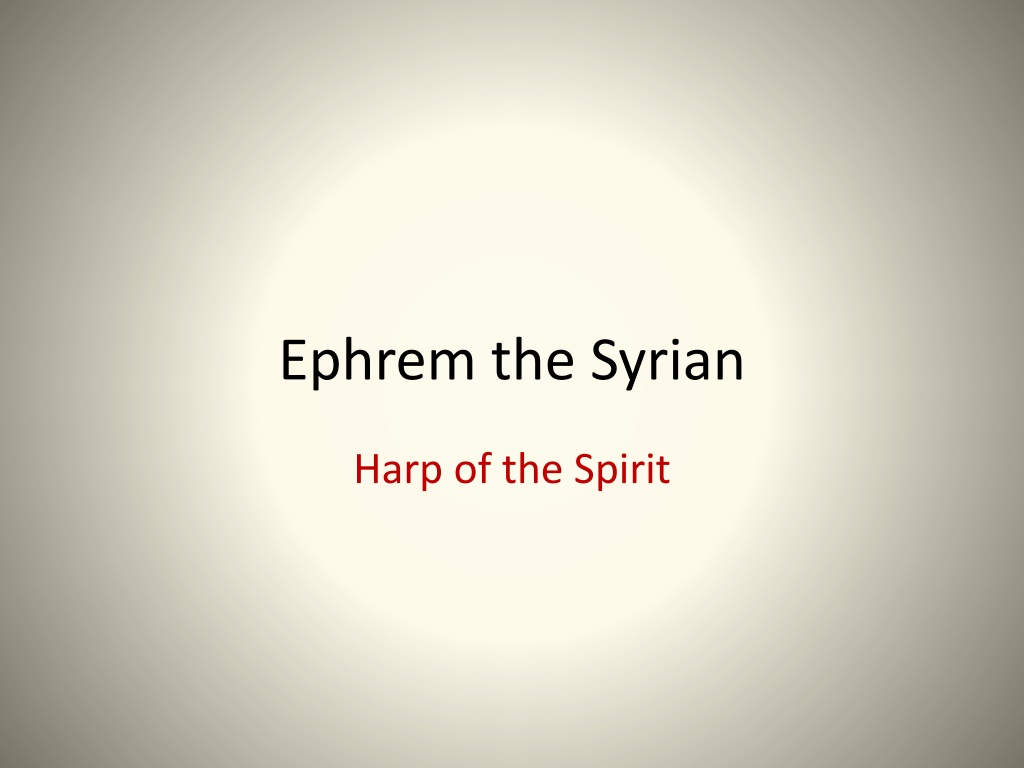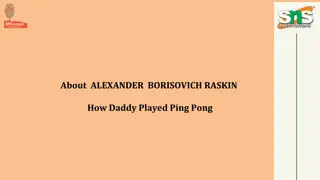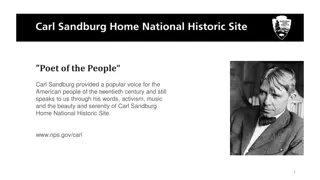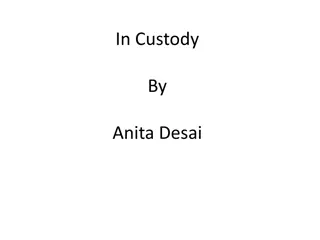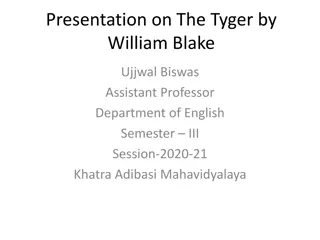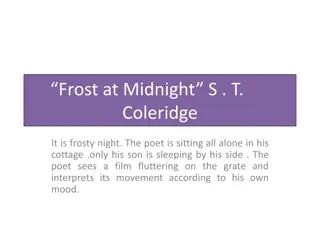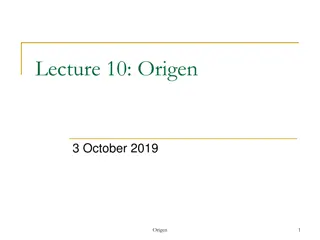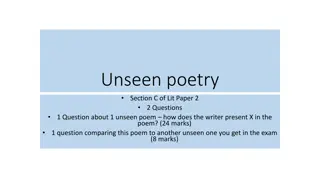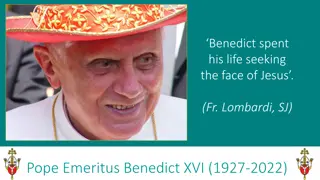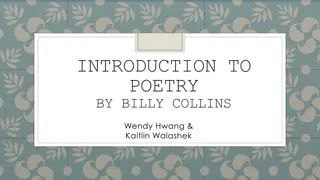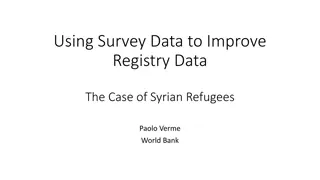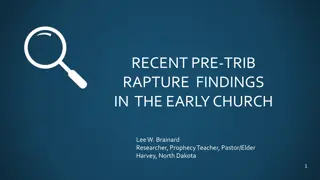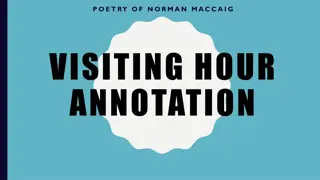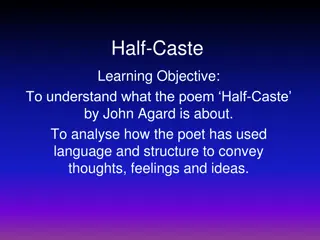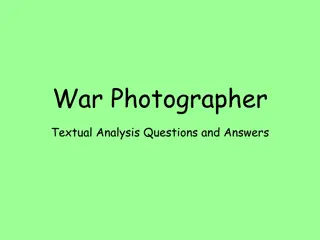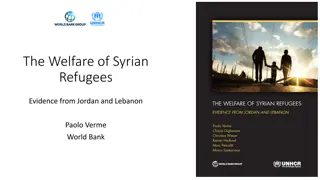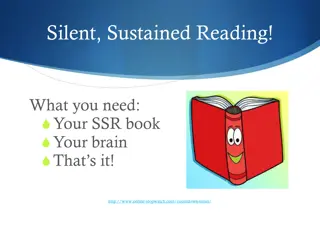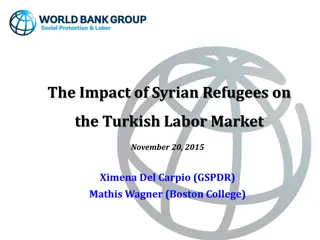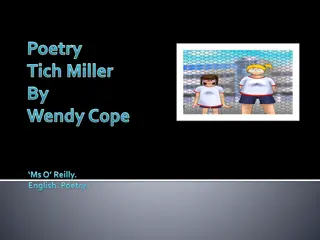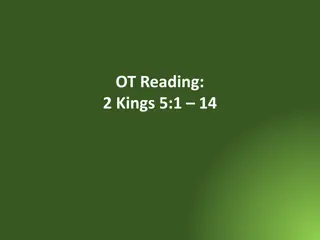Insights into Ephrem the Syrian: The Poet, Theologian, and Exegete
Delve into the life and works of Ephrem the Syrian, a revered figure who excelled as a holy man, poet, hymnist, and theologian. Explore his approach to exegesis, hymn writing, and his impact on Christian thought. Uncover the hidden treasures and spiritual abundance in his writings, offering profound insights and reflections on faith and scriptures.
Uploaded on Sep 30, 2024 | 0 Views
Download Presentation

Please find below an Image/Link to download the presentation.
The content on the website is provided AS IS for your information and personal use only. It may not be sold, licensed, or shared on other websites without obtaining consent from the author. Download presentation by click this link. If you encounter any issues during the download, it is possible that the publisher has removed the file from their server.
E N D
Presentation Transcript
Ephrem the Syrian Harp of the Spirit
Ephrem 306-373 40 years in Nisbis, then Edessa Holy man, poet, exegete, hymnist, theologian Some works translated into Greek Praised by Jerome Many hymns teaching hymns (madrasha) written against heresies
Second Soul Faith in the Scriptures is the second soul Although called an Antiochene in exegetical approach, others have called his work the Christian counterpart to Jewish exegesis . Concentrated on passage rather than verse; often used for theological or polemical purpose
Hidden Treasures Many are the perspectives of his word, just as many are the perspectives of those who study it. God has fashioned his word with many beautiful forms, so that each one who studies it may consider what he likes. He has hidden in his word all kinds of treasures so that each one of us, wherever we meditate, may be enriched by it. His utterance is a tree of life, which offers you blessed fruit from every side of it. It is like that rock which burst forth in the desert, becoming spiritual drink to everyone from all places. They are spiritual food and drank spiritual drink. (1 Cor 10:3-4)
A Superabundance Therefore, whoever encounters one of its riches must not think that that alone which he has found is all that is in it, but rather that it is this alone that he is capable of finding from the many things in it. Enriched by it, let him not think that he has impoverished it. But rather let him give thanks for its greatness, he that is unequal to it. Rejoice that you have been satiated, and do not be upset that it is richer than you Give thanks for what you have taken away, and do not murmur over what remains and is in excess. That which you have taken and gone away with is your portion and that which is left over is also your heritage.
Exegesis Applied exegesis practical and not overly theoretical His prose exegesis is not overly original. His exegesis is similar to the Jewish Haggadah method in many places he is using the Peshitta text of OT or Aramaic targumim Contains many Jewish midrashim, legends and stories Question has been raised: was he in dialogue with Jewish rabbis? A good portion of his exegesis is poetic or in the form of hymns Liturgy the setting readings for day followed by his homilies (memre) and madrashe
Free Will Next, Moses sent forth locusts that devoured the grass and whatever the hail had spared. Pharaoh said: I have sinned against the Lord and against you. Forgive my fault. Now if he had hardened his heart, he would not have spoken these words, because a heart that is hardened is a stranger to remorse. He prayed when he was punished, but became defiant when he was relieved. This was a free man, and these two kinds of behavior testify to his free will.
Dangerous Beauty The tempter then turned its mind to the commandment of Him who had set down the commandment, that Adam and Even were not only commanded not to eat from one single tree, but they were not even to draw near to it. The serpent then realized that God had forewarned them about even look at it lest they become entrapped by its beauty It was not so much the serpent s counsel that entered her ear and provoked her to eat from the tree as it was her gaze, which she directed toward the tree, that lured her to pluck and eat of its fruit.
Before the Struggle The serpent was completely unhindered from coming in all haste because even the serpent s haste worked against the serpent. For, since Even had just been created, she did not yet know what hunger was, nor had she yet been engaged in any inner struggle cause by the beauty of the tree. Therefore, because she was neither fasting nor had been engaged in any contest due to the tree, the serpent was completely unhindered from coming to tempt her.
Time to Repent If Adam and Eve had sought to repent after they had transgressed the commandment, even though they would not have regained that which they had possessed before their transgression of the commandment, they would have escaped from the curses that were decreed on the earth and upon them. God tarried in coming down to them for the sole reason that they might admonish each other and so plead for mercy when the judge came to them. The coming of the serpent had not been delayed lest their trial be too great when they looked upon the sight of that beautiful tree, whereas the judge delayed his coming to them so that He might give them an occasion to prepare their entreaty. But the hast of the tempter did not help them, even though its haste was for the purpose of helping them, nor did they benefit by the delay of the Judge, although His delay was for this same reason.
Becoming Satan Even Satan, who was created, along with his deep abyss, within those six days, was fair until the sixth day, like Adam and Eve who were fair until they transgressed the commandment. Satan, who secretly became Satan on that sixth day, was, on that same day, secretly judged and condemned. For God did not wish to make known Satan s condemnation in the presence of those who had not even perceived that he was the tempter. Remember, the woman said, the serpent, and not Satan, deceived me.
Nature and Scripture Twin Sources of Revelation Look and see how Nature and Scripture are yoked together for the Husbandman: Nature abhors adulterers, practisers of magic and murderers; Scripture abhors them too. Once Nature and Scripture have cleaned the land they sowed in it new commandments in the land of the heart, so that it might bear fruit, praise for the Lord of Nature, glory for the Lord of Scripture.
Two Lyres The Word of the Most High came down and clothed himself in a weak body with two hands. He took up and balanced two lyres, one in his right hand and one in his left. A third he put in front of him, to be a witness for the other two; for it was the middle lyre corroborating that their Lord was singing to their accompaniment.
Types and Symbols In the Torah Moses trod the Way of the types and symbols before that People who used to wander every which way. But our Lord, in his testaments, definitively established the path of Truth for the Peoples who came to the way of Life. All the types and symbols thus travelled on that Way which Moses trod and were brought to fulfillment in the Way of the Son. Let our mind then become cleared land for that Way. Instead of on the ground, my brothers, let us, in our souls, tread the Way of Life.
The Whole and Complete Scriptures Like the body of the alphabet, which is complete in its members, neither subtracting a letter, nor adding an extra one, so is the Truth which is written in the Holy Gospel, in the letters of the alphabet, the perfect measure which does not accept less or more.
Clothed in Our Language Let us give thanks to God who clothed Himself in the names of the body s various parts: Scripture refers to His ears, to teach us that He listen to us; it speaks of his eyes , to show that He sees us. It was just the names of such things that He put on, and, although in His true Being there is not wrath or regret, yet He put on these names too because of our weakness. We should realize that, had He not put on the names of such things, it would not have been possible for Him to speak with us humans. By means of what belongs to us did He draw close to us: He clothed Himself in our language, so that He might clothe us in His way of life.
On Paradise In his book Moses described the creation of the natural world, so that both Nature and Scripture might bear witness to the Creator: Nature, through man s use of it, Scripture, through his reading of it. These are the witnesses which reach everywhere; they are found at all times present at every hour, confuting the unbeliever who defames the Creator. I read the opening of this book and was filled with joy, for its verses and lines spread out their arms to welcome me; the first rushed out and kissed me, and led me to its companion; and when I reached that verse wherein is written the story of Paradise, it lifted me up and transported me from the bosom of the book to the very bosom of Paradise.
Bridge and the Gate The eye and the mind traveled over the lines as over a bridge, and entered together the story of Paradise. The eye as it read transported the mind; in return the mind, too, gave the eye rest from its reading for when the book had been read the eye had rest but the mind was engaged. Both the bridge and the gate of Paradise did I find in this book. I crossed over and entered; my eye remained outside, but my mind entered within. I began to wander amid things indescribable. This is a luminous height, clear, lofty and fair: Scripture named it Eden, the summit of all blessings.
Gods Beauty Moses testifies that while it was granted to him to do everything like god, at last he abandoned everything and prayed to see the Lord of all. For if the creatures of the Creator are so pleasant to look upon, how much more pleasant is their Creator to look upon; but because we have not an eye which is able to look upon his splendour, a mind was given us which is able to contemplate his beauty. A far more glorious than the body is the soul, and more glorious still than the soul is the mind (spirit), but more hidden than the mind is the Godhead. At the end the body will put on the beauty of the soul, the soul will put on that of the mind, while the mind shall put on the very likeness of God s majesty.
Mirror Image The scriptures are set up like a mirror; one whose eye is clear sees there the image of the truth. Set up there is the image of the Father; depicted there is the image of the Son, and of the Holy Spirit
Finding God In All Things In every place, if you look, his symbol is there, and wherever you read, you will find his types. For in him all creatures were created and he traced his symbols on his property. When he was creating the world, he looked to adorn it with icons of himself. There springs of his symbols were opened up to run down and pour forth his symbols in to his members.
Mystery Symbols Raza Persian and old Aramaic meaning secret Daniel 2:18; Dead Sea Scrolls Ephrem and Syrian writers: mystery symbol related to type but much deeper Raze types in bible, sacraments, even Nature
God the Artist You have gathered up scattered raze from the Torah, that are pertinent to your comeliness. You have published the models which are in you Gospel, along with the prodigies and signs of Nature. You have mixed them together as the paints for your portrait; you have look at yourself, and painted your own portrait. Here is the painter, who in himself has painted his Father s portrait; two portrayed, the one in the other. The prophets, the kings, and the priests, who were creatures, all of them painted your portrait, but they themselves bore no resemblance. Created beings are not capable; you alone are capable of painting the portrait. They indeed drew the lines of your portrait; you in your coming brought it to completion. The lines then disappeared due to the strength of the paints, the most brilliant of all colors.
